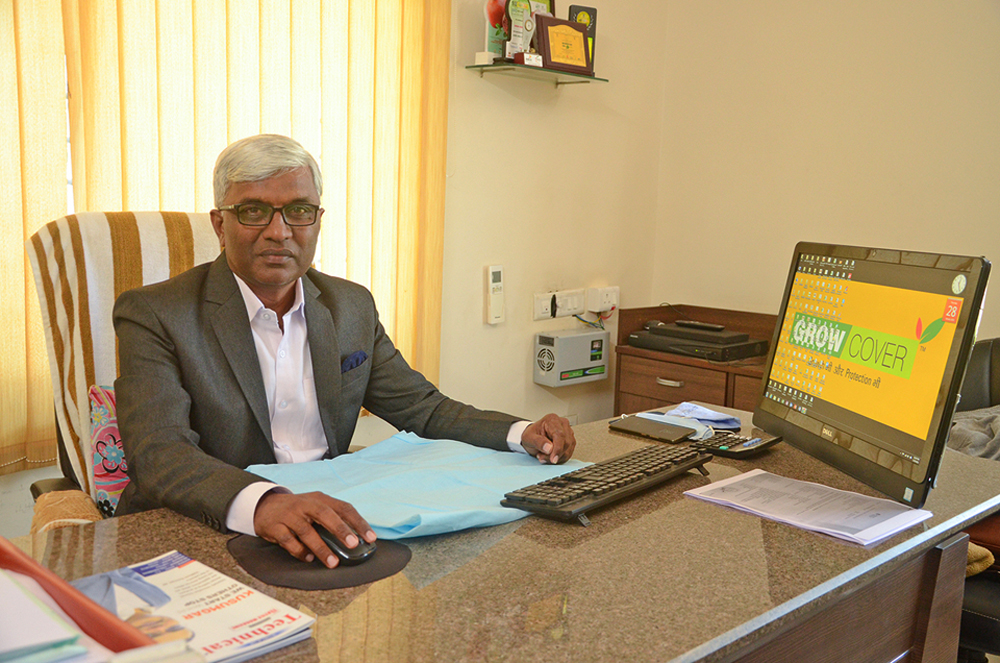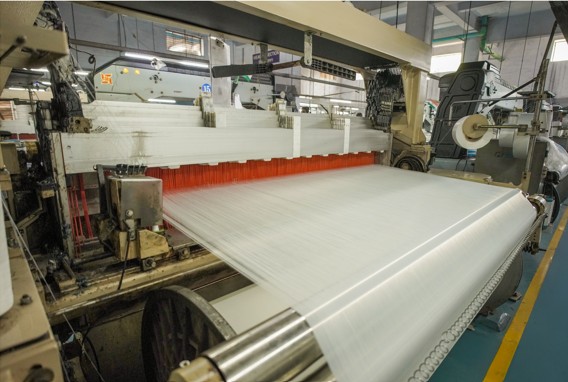Nonwoven Federation of India (NWFI) was founded in June 2020 when COVID pandemic was at its peak disrupting life and economies worldwide. The purpose of its birth is to strengthen the Indian technical textile industry’s nonwoven segment. Ganesh Kalidas catches up with Suresh Patel – President, NWFI for an exclusive interview and finds out more about the role of NWFI, the challenges it is already facing and the targets it plans to achieve.

The COVID pandemic continues to be an unwelcome guest. It has put the entire world at the risk of unprecedented health challenges, which are still refusing to die down. With mutated virus strains on the horizon, the risk is only amplified.
The Indian textile industry – especially the nonwoven vertical – has ably risen to the occasion and has addressed multiple issues – including a major one which is to produce personal protection gear (PPE) at a massive scale in a short time.
And hence was born Nonwoven Federation of India (NWFI) to take the spunbond nonwoven segment forward and provide solutions for both the domestic and international markets.
Suresh Patel – President, NWFI explains the basics of NWFI: “NWFI comprises representatives of all our regional associations of spunbond nonwoven fabric manufacturers in India. Our objective is to promote it in India and abroad. NWFI has the means and the capability to become the voice of the spunbond nonwoven manufacturers and is determined to help address their issues, including investments, production, marketing and distribution, help draft export and import policies, work on new developments, applications and expansion of the market.”

Head quartered in Delhi, NWFI will have a permanent total membership of 25 representatives and boasts of multiple regional offices in Himachal Pradesh, Haryana, Gujarat, Chennai, Kolkata, Mumbai and Chattisgarh. NWFI also includes members from the Indian Nonwoven Manufacturers Association (IndiNON) from across India.
Patel shares: “Out of the 55 members of IndiNON and other regional associations, we have selected few from each state association. The duration of the membership will be 2 years, after which new members will be given the opportunity to be part of NWFI. Thus, everyone gets to work for the common cause.”
NWFI – Dedicated to Health
The primary function of the NWFI would be to confer directly with the government and help the officials understand and realize the dynamics playing out at the ground level.
Patel says: “NWFI will be able to make recommendations to the government regarding new policies that our industry needs. We will provide technical data to the concerned officials on a regular basis and help them become aware of products and the categories that we produce for. It is crucial to make the government to realize the importance of NWFI’s role. For instance, last year during COVID, many health and hygiene products were banned from being exported, which resulted in the industry facing problems. NWFI, to mitigate the negatives, conducted market research and collected data of the products that were available for exports and took the results to the concerned ministry. We also conducted webinars and talks with the government officials and made them realise that banning the export of the masks was, in reality, leading to the suffering of the industry.”
Eventually, NWFI was able to help remove the ban on the exports of the masks, nonwoven fabrics and PPE Kits because with the increased production capacities, Indian manufacturers were in a solid position to manufacture and export masks on a large scale, thus helping the world while staying afloat businesswise domestically too.
Moving forward, NWFI’s target is to remove ban on nonwoven bags which is implemented by a few state governments.
According to Patel, the CAGR for the nonwoven fabrics indicates more than 15% growth in the near future.
NWFI and ITTA – Strengthening Indian Textile Industry
If NWFI is practically a new born, Indian Technical Textiles Association (ITTA) was registered in 2010. The decade old organization represents the entire technical textile value chain from raw material to finished goods along with the producers, machinery manufacturers and R&D institutions among other stakeholders. With 300 members, ITTA’s objective is to promote and develop the production and the export of technical textiles to put India on the global map.
Patel reassures: “The basic difference between ITTA and NWFI is that the former manufacturers 14 categories of products in the technical textiles segment while we are focused only on the nonwoven fabrics. There is no competition between ITTA and NWFI. We both support each other. Many NWFI manufacturers are also the members of ITTA.”
Both NWFI and ITTA have been conceptualized to strengthen the Indian technical textile industries across various verticals both in the domestic and international markets.
Advise to New Entrants
As the nonwoven industry segment is growing – both out of the necessity to produce personal protection gear in view of the pandemic, and also because of the business potential the segment is offering – new business houses are cropping up faster than ever before.
Patel has a word of caution for them: “People who are new to this industry are entering this segment while those who are already part of the industry are increasing their capacities and manufacturing nonwoven products. We believe this is good for both the nonwoven industry and for their business also. Our suggestion to the new entrants would be that they must first gauge how long the effect of COVID will be there and the scope of benefit it will offer the industry. They should conduct thorough research first and only then enter this vertical.”
It is a fact that the nonwoven segment is witnessing massive growth spurts purely due to the pandemic. And that is why Patel suggests that the aspirants to this segment may want to adopt wait-and-watch attitude and only then make their decision.
In a nutshell, as a growing segment, nonwovens is indeed packing major potential and NWFI is confident of doing good work.
Afterall, their motto is to make the association stronger so that, going forward it will strengthen the Indian textile industry as a whole too.





